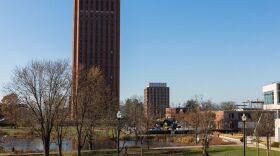After the COVID-19 spring surge, nurse Jennifer Williams started taking a blood pressure medication and seeing a therapist. Her stress level dropped this summer, but now, as her COVID-19 unit at Sturdy Memorial Hospital fills again, Williams says she feels the panic rising. Some days, after work, she sits in her car and cries.
“I didn’t realize the impact that it had on me during the spring because it was busy, and it was new,” she says. Now “emotionally, I have to brace myself.”
This time around Williams knows, in advance, how devastating the disease can be.
“It’s very, very scary,” Williams says of being a COVID-19 nurse. “We can’t, we can’t help in a lot of ways, we can just watch. It’s just unpredictable, and it’s very, very frightening.”
During ambulance runs, paramedic Ben Podsiadlo says he sees the cumulative effects of the first surge on the strained faces of his co-workers. There were just so many 911 calls for COVID-19 patients who couldn’t be saved.
“This brought a big toll on our paramedics and EMTs, seeing that much death,” he says. “There was a lull, “but the anticipation of perhaps another return is not something anyone’s looking forward to.”
Podsiadlo, the director of clinical integration at Armstrong Ambulance Service, says emergency responders are ready for whatever comes. But there are widespread concerns about burn-out among health care workers, depression, and about more drinking and drug use to numb the rising tensions. The stress appears to be fueled by both the lingering physical and mental impact of the spring surge, as well as looming fears about what’s ahead.
Reverend Katie Rimer has a theory about burnout that guides what she calls “this phase of the pandemic.” It’s based on a quote from best-selling author, Dr. Rachel Naomi Remen: “We burn out not because we don’t care but because we don’t grieve.”
So when Rimer gets calls these days from distressed staff, she urges them to pause, talk through what’s been hard and name what they’ve lost. It can take some coaching for clinicians who are trained to keep their emotions in check.
“This has been so compressed in terms of time, where we’re already thinking about maybe having to do it again, that part of my work is to remind people to grieve,” Rimer says.
Dr. Damian Archer, the chief medical officer at North Shore Community Health Center, says many health care workers who were asked to care for COVID-19 patients without proper protection are suffering from a loss of trust. He calls the experience of providing care, under duress, when nurses and others didn’t feel safe, a moral injury.
Archer says he tries to heal these injuries and restore trust with weekly virtual meetings about the latest coronavirus developments and discussions about staff needs.
“It’s also being open to be honest and transparent about what you have and what you don’t have,” he says, “and that you are asking people to go beyond what is usual and normal because of the lack of resources.”
Staff were stretched thin in health care centers and hospitals across Massachusetts this spring. During the first surge, hospitals moved staff around, breaking up long-standing teams and sometimes asked more of younger, single or healthier employees than others. Fears of a repeat experience are fueling some of the second surge anxiety.
“People are aware of differences,” says Dr. Paul Biddinger, medical director for emergency preparedness at Mass General Brigham. “What they want to be assured of is fairness and equity so that if there is a second surge, the way in which staff are asked to respond, the way in which people step up, is spread out as evenly as possible, as fairly as possible across all of our role groups.”
Biddinger and other hospital leaders are looking into a “battle buddy” system that connects employees who then watch out for each other. Some hospitals are ramping up other peer support systems, and others are staffing up with traveling nurses and temps to avoid calling tired employees in for extra shifts as COVID-19 hospital admissions increase.
And hospitals have corrected some of the technical problems identified during the first surge. Ventilators from various sources, for example, couldn’t be plugged into existing alarm systems. So hospital staff became human alarms, sitting outside rooms, listening and watching for alerts that something was wrong. Biddinger says that issue has been fixed at MGB facilities.
Biddinger says a growing anxiety is palpable as he walks hospital halls, listening to staff “who did such an amazing job” in the spring debate the fall daily coronavirus numbers and what they might mean: Is this the second surge? Will it be worse than the first one? How long will it last?
Biddinger says no one has answers for those questions right now, and that’s difficult.
“Let’s acknowledge it,” he says. “Let’s make sure we’re delivering services and resources to staff to help them respond, but let’s also call it what it is – which is a fear of the unknown that we cannot fully resolve because we don’t know what the future holds.”
That unpredictability may be particularly difficult for people in medicine who are guided by numbers, protocols and science. Those elements are shifting, sometimes daily, during the coronavirus pandemic.
“There is uncertainty in every single part of our lives, from the patient care and how to treat them and the testing,” says Dr. Sheena Sharma, “all the way around to your personal life and whether you’re going to get really sick from this or god forbid, worse.”
Sharma, a cardiologist in private practice, says she’s resigned to the idea that the pandemic will get worse, so she tries not to dwell on the daily case updates.
“Otherwise you’re adjusting every day,” she says, “which I don’t find helpful. I actually tell my patients, ‘Stop, how is that helping, just keep following the precautions.’ ”
Dr. Susan Ly, on the other hand, studies the positive case rates and deaths, the COVID-19 admissions, and the ICU bed capacity at her hospital and beyond before each shift.
“For me that just develops a little bit of a mindset, what kind of environment am I going to be prepared for,” says Ly, an emergency room physician at Lowell General Hospital.
But Ly says it’s hard to keep going at such a demanding level. Yes, she says, hospitals are better prepared for COVID-19 patients after the spring surge, but unlike in the spring, flu is on the rise and patients who avoided emergency rooms earlier in the year are back.
“We’re getting just so beat with this, COVID, COVID, COVID, be prepared all the time,” she says. “But now we have all our kind of normal stressors in addition. So for me that is something that is always looming overhead.”
The EMTs and paramedics who deliver patients to emergency rooms are worried about overload this fall and winter too.
“There’s a lot going on in America right now and in the world that’s beyond COVID-19,” says Podsiadlo, “with the political tensions in the country, the hyper-polarization.”
Ly says health care workers need the public’s help to get through whatever is coming: wear a mask, keep your distance, wash your hands.
“Be vigilant and patient,” she says, “because we’re all trying to get through this together.”
This article was originally published on WBUR.org.
Copyright 2020 WBUR






